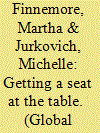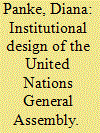|
|
|
Sort Order |
|
|
|
Items / Page
|
|
|
|
|
|
|
| Srl | Item |
| 1 |
ID:
133475


|
|
|
|
|
| Publication |
2014.
|
| Summary/Abstract |
Inclusive participation by all states is now taken for granted in many global governance efforts, but this was not always the normal practice. Nineteenth-century multilateralism, embedded in a world of "great powers," actively rejected broad participation, valuing small numbers, hierarchy, and status in coordinating action. Construction of broader participation norms in the late nineteenth and early twentieth centuries was a joint project that owes much to innovations in the Americas and regional norms developed within that group as it organized meetings among the American states. Central to these norms was sovereign equality that, in the American context, entailed universal participation of all American states and voting on a one state-one vote basis at conferences. This article traces the spread of these norms from the Americas to the Hague Conferences of 1899 and 1907, and highlights the varied sources for many of our contemporary multilateral practices in these early events.
|
|
|
|
|
|
|
|
|
|
|
|
|
|
|
|
| 2 |
ID:
152333


|
|
|
|
|
| Summary/Abstract |
Most international organizations are based on the principle of equality of states. Their institutional design grants all member states the same formal rights. Although formally equal, states differ immensely concerning their power capacities and size. Can institutional designs of international organizations mitigate real-world power- and size-related differences between member states, and if so, to which extent? To provide an answer, this article focuses on the United Nations General Assembly, which combines an equalizing institutional design with a large very heterogeneous membership. It shows that the strength of the equalizing effect varies across stages of the policy cycle. It is the weakest in the negotiation stage and the strongest in the final decision-making stage, while institutional design of international organizations has a de facto equalizing effect of medium strength in the agenda setting stage. Thus, while power and capacity differences matter, larger powerful states are not systematically better off throughout the entire policy cycle.
|
|
|
|
|
|
|
|
|
|
|
|
|
|
|
|
| 3 |
ID:
138820


|
|
|
|
|
| Summary/Abstract |
State sovereignty is a fundamental organizing principle of international relations. Although always imperfectly respected, the sovereignty norm-set— territorial integrity, sovereign equality, and noninterference—carries enormous weight. It is not, however, static or monolithic, and this article seeks to historicize and contextualize sovereignty in the Global South by examining one of its essential components, the norm of noninterference. Making use of qualitative and quantitative evidence, it argues that the norm of noninterference, held sacrosanct in developing regions during the postdecolonization era, has eroded in important ways in Latin America and Africa as regional interference practices in response to domestic crises have gained legitimacy in the post–Cold War era. Noninterference has meanwhile been upheld and protected to a much greater degree in Southeast Asia.
|
|
|
|
|
|
|
|
|
|
|
|
|
|
|
|
| 4 |
ID:
113302


|
|
|
|
|
| Publication |
2012.
|
| Summary/Abstract |
Although the Westphalian model takes many forms the association of Westphalian and sovereign equality is a prominent one. This article argues firstly that sovereign equality was not present as a normative principle at Westphalia. It argues further that while arguments for sovereign equality were present in the eighteenth century they did not rely on, or even suggest, a Westphalian provenance. It was, for good reasons, not until the late nineteenth century that the linkages of Westphalia and sovereign equality became commonplace, and even then sovereign equality and its linkage with Westphalia were disputed. It was not until after the Second World War, notably through the influential work of Leo Gross that the linkage of Westphalia and sovereign equality became not only widely accepted, but almost undisputed until quite recently. The article concludes by suggesting that not only did Gross bequeath a dubious historiography but that this historiography is an impediment to contemporary International Relations.
|
|
|
|
|
|
|
|
|
|
|
|
|
|
|
|
|
|
|
|
|